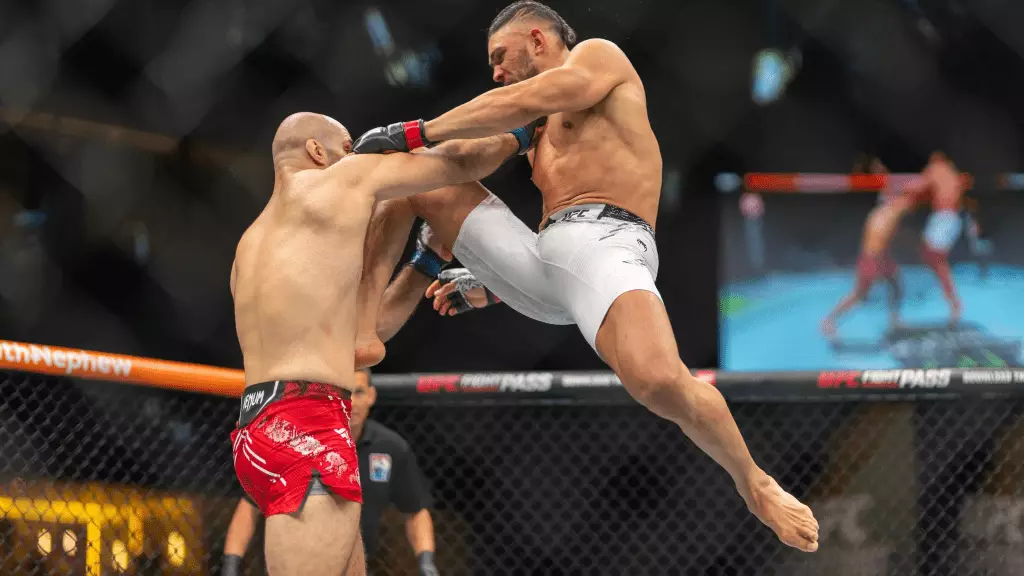The world of mixed martial arts (MMA) is notoriously unforgiving, and for fighters like Johnny Walker, the emotional and physical toll can be overwhelming. Recently, Walker faced a significant setback when he was forced to withdraw from UFC 311, where he was set to face Bogdan Guskov. The news of his withdrawal following a “bad injury” was not just a blow to his career; it was a crushing interruption in a personal journey marked by substantial changes and sacrifices. For Walker, who switched his life from Dublin to the United States with his family and committed to a rigorous training regime in a new environment, the loss was particularly disheartening.
With a record of 21 wins and 9 losses in MMA and a solid standing in the UFC, Walker was poised for a significant fight that could propel him further in his career. However, the reality of sustaining a rib injury during what was supposed to be a productive training camp forced him to reassess his trajectory. The physical pain was compounded by a mental struggle, as Walker had invested not only time and effort but also substantial financial resources into this pivotal moment in his career.
In interviews, Walker candidly expressed the emotional weight of his situation. “It was very upsetting because I put so much effort and money into making this happen,” he reflected. The mental strain caused by the injury was fueled by a sense of lost opportunity, especially after the effort he put into adjusting to life in the U.S. He left behind a stable training environment in Ireland under renowned coach John Kavanagh and came to America with hopes of revitalizing his career. This transition, paired with the rigorous demands of training, created an environment rife with stress, making the injury feel like an insurmountable roadblock.
The physical nature of the injury highlighted the risks that fighters face during training. “It was nothing stupid,” Walker explained, describing how he was engaged in technical sparring when the injury occurred. This incident reminds fans of the unpredictable nature of injuries in high-stakes sports and underscores the thin line athletes walk between peak performance and susceptibility to physical setbacks. Such injuries can strike at the most unexpected moments, leading to frustration and disappointment, which can be debilitating for a professional’s psyche.
Despite this setback, Walker’s experiences have compelled him to reevaluate his past training methods and environments. After training at SBG in Ireland, he acknowledged that while the coaching was top-notch, the lack of varied training partners limited his growth. This realization has fueled his desire to hone his skills in a more competitive setting where he can be challenged regularly. “You need challenges,” he stated, emphasizing the move to train in Las Vegas, where he now has access to high-level opponents and comprehensive resources.
This newfound environment is key for Walker as he aims to return stronger and more prepared. His attitude reflects a significant shift to a focus on growth and versatility. With access to facilities like the UFC Performance Institute, he is able to tap into valuable resources for nutrition, conditioning, and recovery, which are crucial for any fighter looking to maximize their potential.
Johnny Walker is now targeting a return to the octagon, eyeing a timeframe between April and May. As he embarks on the road to recovery, the need for patience has become apparent. “You can’t do much with rib injuries,” he noted, speaking on the protracted nature of recovery. “You just have to stop, wait, and let it heal.” It’s a difficult pill to swallow for an athlete with a competitive spirit, but it’s a necessary stage in the healing process.
As he plans his comeback, Walker’s resilience shines through. Having learned from past mistakes and now accustomed to a more dynamic training environment, he aims to emerge as a more formidable opponent. His experience serves as an inspiration to other fighters who may face similar adversities in their careers. The journey of Johnny Walker is more than just about physical preparation; it’s about embracing change, overcoming hurdles, and striving for greatness amidst the challenges that life and sports throw his way. With each setback, he grows closer to unveiling the best version of himself inside the UFC octagon.

